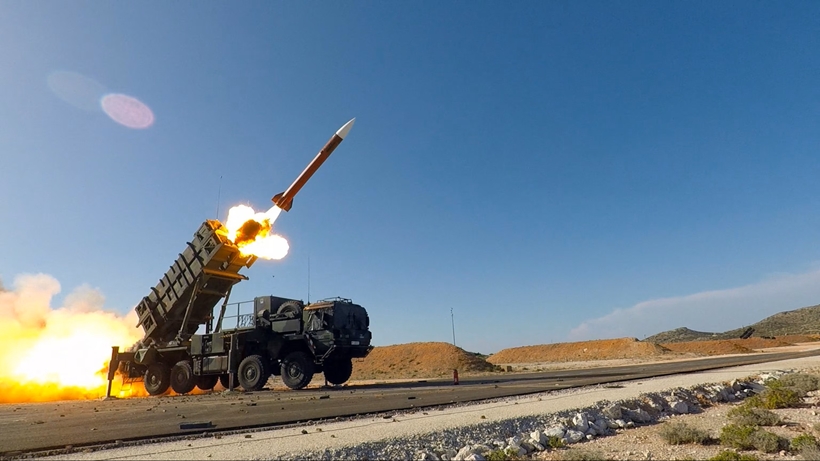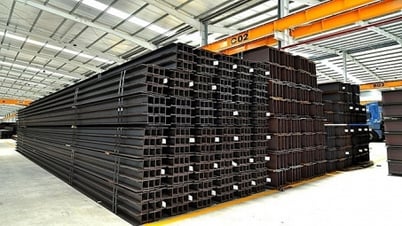The US is reviewing its arms aid not only to Ukraine but also to many other countries around the world . This move continues to clearly demonstrate the “America First” policy under the Trump administration, when Washington prioritizes ensuring domestic defense needs over pursuing lucrative arms contracts.
Analysts say the US's tightening of aid and arms sales reflects growing pressure even on the world's number one defense exporter, as demand for air defense systems and artillery shells in many hotspots far exceeds supply.

Patriot missile defense system during the Slovakia 2022 missile defense exercise. Photo: Reuters
According to the Stockholm International Peace Research Institute (SIPRI), from 2020 to 2024, the US accounted for 43% of total global arms exports. However, with the wave of increasing defense demand in the world, the supply is unlikely to meet all, said expert Jacob Funk Kirkegaard from the Bruegel Institute (Belgium).
Ed Arnold, an expert at the Royal United Services Institute (RUSI), said the Pentagon's review was necessary, especially for certain types of missiles and ammunition that have long been in short supply. However, this will put considerable pressure on countries that are receiving weapons aid from the US, especially those that cannot yet produce their own defense production lines.
Ukraine unexpectedly suffered a blow
Ukraine is the country most affected by Washington’s new policy. It is not yet clear whether the US will suspend arms supplies to other countries, but a slowdown in deliveries to Kiev has already begun to emerge, according to the New York Times.
Although no longer completely dependent on the US as in the early stages of the conflict with Russia, military aid from Washington remains important to Ukraine. The US State Department said that since Russia launched a full-scale military operation in February 2022, the total value of US military aid to Ukraine has reached about $67 billion.
US officials confirmed on July 2 that they had halted arms deliveries to Ukraine after a review of US ammunition stockpiles revealed serious shortages. The Ukrainian Defense Ministry said it had not received an official notification from the US and had requested a phone call with Washington officials.
“We are constantly assessing ammunition stocks and their destinations,” said Sean Parnell, a spokesman for the US Department of Defense. He also acknowledged that the Biden administration had “distributed too much ammunition without properly accounting for domestic stockpiles.”
Washington has refused to provide details on the quantity and type of weapons aid, as well as when shipments to Ukraine will resume. According to US media, the suspended weapons include 155mm artillery shells, more than 100 Hellfire missiles, GMLRS precision-guided munitions, and dozens of Patriot air defense missiles.
Among them, Patriot interceptor missiles have always been on Ukraine’s priority list. Experts say that although the US arsenal is still abundant, the anti-aircraft and artillery ammunition that are the backbone of the aid packages for Kyiv are now limited.
Jim Townsend, a former Pentagon official, acknowledged that the US Patriot missile stockpile has long been “fragile.” However, according to former Ukrainian lawmaker Lesia Orobets, Kiev has no other option to deal with Russian ballistic missiles other than Patriots.
Experts say Ukraine needs to boost its domestic defense industry and seek support from European partners, who have been with Kiev for many years. “Currently, Ukraine can partially compensate for the lack of aid from the US with supplies from Europe,” said Andrii Ziuz, former head of the National Security and Defense Council of Ukraine.

US President Donald Trump and Defense Secretary Pete Hegseth at the NATO Summit in The Hague, Netherlands. Photo: Reuters
Europe faces the challenge of self-reliance
The new US policy also puts Europe on a more self-reliant footing. According to experts, Washington’s review is unlikely to affect international arms sales contracts, which are the lifeblood of the US defense industry.
European countries have long been big buyers of American weapons, especially the Patriot system and its accompanying interceptor missiles, which are in extremely short supply. But the fact that even Washington is facing a shortage is a worrying sign for the rest of NATO. “This will suffocate Europe’s air defense needs,” Arnold warned.
Under pressure from Washington, NATO countries, including Canada, have pledged to increase defense spending to 5% of GDP, a target that was considered unrealistic until the NATO summit in late June.
In parallel, the European Commission announced in March that it would mobilize about 800 billion euros ($900 billion) to strengthen the defense capabilities of member states under the “Rearmament of Europe” initiative. This is considered the largest military reconstruction program of the continent since the Cold War.
However, according to Mr. Kirkegaard, the expansion of defense production capacity in Europe is still in its infancy and is unlikely to meet demand in the short term, especially in key areas such as air defense.
NATO Secretary General Mark Rutte said the alliance would invest heavily in increasing its air defense capabilities fivefold, while adding thousands of tanks, armored vehicles and millions of artillery shells.
“Europe and Ukraine need to double or even triple their efforts to become self-sufficient in defense, especially in the field of air defense, so as not to depend on the US,” Mr. Kirkegaard emphasized.
Israel remains Washington's top priority
While aid to Ukraine is under review, Israel continues to be the top destination for advanced US-made air defense weapons, especially Patriot missiles. This demand increased after Iran’s repeated ballistic missile attacks in May.
In addition to Patriot, Israel also deploys other advanced defense systems such as THAAD (Terminal High Altitude Area Defense) provided by the US. Unlike Ukraine, the US is deeply involved in Israel's air defense system, and US soldiers even directly participated in the war, shooting down Iranian missiles aimed at Israeli territory.
“There is no doubt that Israel is the number one priority for the US in terms of advanced air defense weapons,” Mr. Kirkegaard commented.
Israel also has a strong domestic defense industry and is one of the world's largest arms exporters. According to the Israeli Ministry of Defense, 2024 will be the fourth consecutive year of growth in defense exports, especially contracts signed with Europe.
Last year, defense deals with Europe accounted for 54% of Israel's total exports, up from 35% in 2023. Items such as missiles, ammunition and air defense systems accounted for nearly half of total exports.
However, Israel itself is facing a shortage of ballistic missile interceptors, especially in the context of increasing threats from Iran, Russia and North Korea.
“Not only Israel, but all countries need to dramatically increase the production of air defense weapons, because the scale and frequency of ballistic missile attacks are increasing,” Mr. Kirkegaard warned.
Source: https://khoahocdoisong.vn/thieu-hut-ten-lua-patriot-chau-au-va-ukraine-lo-ngai-phong-khong-mong-manh-post1552735.html


































































































Comment (0)